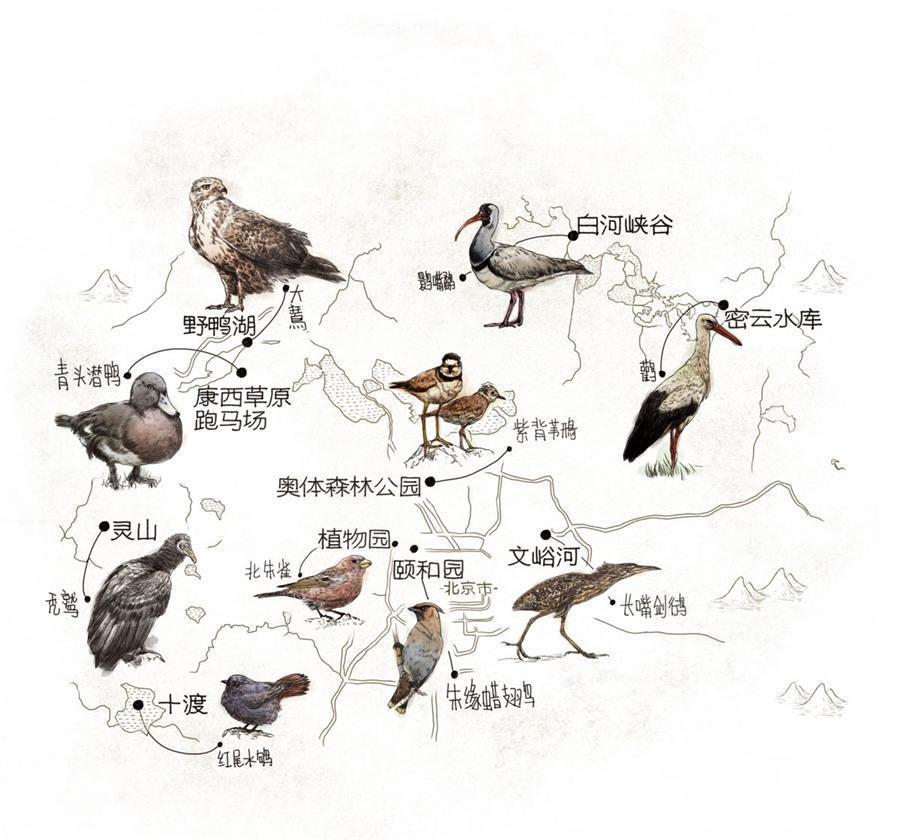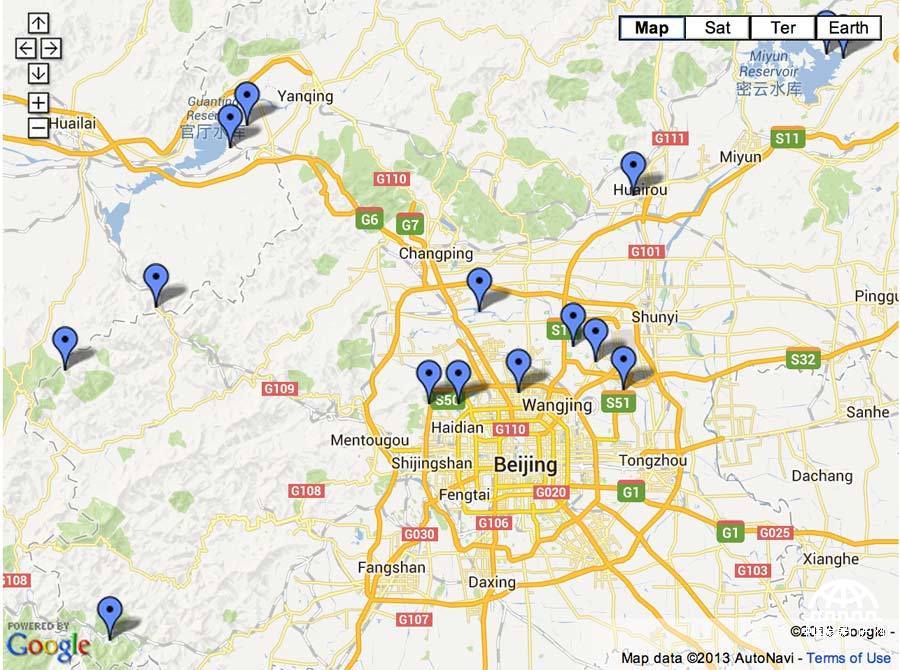A foreign birder’s life wandering in nature in Beijing
chinagate.cn by Guo Rui, October 9, 2014 Adjust font size:
Beijing birdwatching map drawn by Terry
Beijing birdwatching map shows the area to be a world-class habitat for migratory birds
A Beijing birdwatching map which Terry created and uploaded to his blog shows birdwatching places, common bird types and even transport information. Because friends are always asking him where to go birdwatching in Beijing, he decided to share and constantly update his special birdwatching knowledge online.
Every clear day, Terry will pack up to go birdwatching. He spends a whole day outside in the sunshine, and he spends even more time uploading new birdwatching notes and photos to his “Birding Beijing” blog, which now has around 200 posts. The pieces of information he records in his blog are all basic data in a scientific bird research database that he is building. "There are many young people who look at the latest birding information and use it to arrange a time to go to that place for birdwatching. Every time I come across these people, I am very happy, because it makes me feel like I doing something meaningful."
Faced with many difficulties in the birdwatching process, Terry has posted a quote from Nelson Mandela on his blog: “Part of being optimistic is keeping one's head pointed toward the sun, one's feet moving forward.” Mandela means that everything has two sides, and there is no absolute good or bad. Once we have made a choice, we have to accept all the possible consequences.
Like most people, Terry understands that Beijing is not exactly a "heavenly environment," but there are things about this place that he finds satisfactory, for example, its geographical birdwatching advantage. Each year, a large number of Siberian birds fly through Beijing on their migration routes, and they become guests in this city. "This is a rest stop on their long-distance flight – they stop to take a rest, drink water, look for something to eat, and then travel on to the next place." During his four years in Beijing, Terry has carried out his birdwatching trips at a rapid pace, and he has traveled to almost every urban park and suburban green area here. Wild Duck Lake, Miyun Reservoir, Shidu and Lingshan Mountain are among his favorite places, which Terry praises as "world-class habitats for migratory birds."
Speaking about his most rewarding birdwatching experience, Terry was very excited to show us photos of Jankowski's bunting (Emberiza jankowskii), a rare and endangered species which lives only in China’s Inner Mongolia Autonomous Region and Jilin Province. It is a brownish bird with dainty body which looks like a sparrow, and because it garners little attention, this species of bird is on the verge of extinction – there are now only 100-150 of them known to be living. These birds prefer to live in the grasslands of Inner Mongolia, and since the grasslands have gradually been disappearing due to overgrazing and agricultural development, nowadays one can only find these birds in a few places. Terry mobilized the Beijing Birdwatching Society and Birdlife International to cooperate with local farmers and government to found the "Saving Emberiza jankowskii Foundation" in 2013.
Terry is dedicated to saving endangered birds. One of them is Aythya baeri (Baer’s pochard), which lives in Hebei’s Hengshui Lake. "This species’s habitat is in very poor condition at present. I am trying to cooperate with the Beijing Birdwatching Society and Birdlife International now, and we hope that a bill can be drafted to protect this endangered species," Terry told us.
When asked about the differences between foreign and Chinese birdwatching trends, Terry said, "One-sixth of 60 million English people love birdwatching, and more than 1 million participate in bird protection activities. Although China has nearly 1.4 billion people, and over 22 million people live in Beijing, only 300 have joined the birdwatching society. This may be a result of China’s relatively low level of economic development, high pressure on people at work and less leisure time, because birdwatching requires plenty of leisure time and expensive equipment." He believes that as China’s social and economic level improves and people’s wealth increases, after about 20 or 30 years, as in contemporary London, more and more people will participate in this environmental protection army.
Terry’s Beijing birdwatching map




